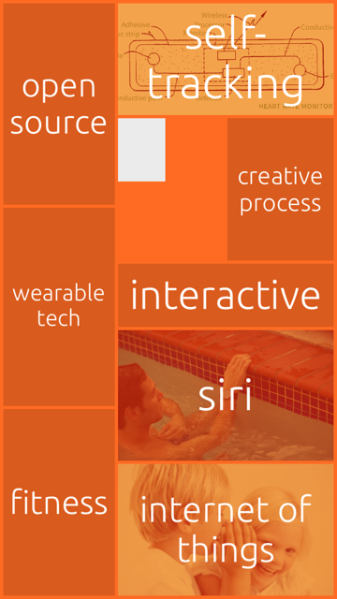You know what it’s like to run out of good online content: You’ve read everything on all your favorite websites and you’re wanting more. Well, news discovery startup Random thinks it can solve the problem of what to read next by randomly feeding you fresh, relevant content with only a few taps on its newly launched iOS app.
Random is a content discovery service similar in scope to StumbleUpon, but with much less direction. When you first launch the app, you’re see a screen filled with tiles that contain randomly generated tags. Clicking a tag will push you to a random related article. When you’re finished, you navigate back to the home screen to see more tags that are loosely affiliated with the one you just clicked.
For example, I clicked the “streaming music” tile, which pulled up my recent article about Rhapsody ending its partnership with Echo Nest. And when I navigated back to the home screen, there were new tiles that were somewhat related, such as “Spotify,” “music business,” “musicians,” etc.
I played with it for a good 20 minutes and saw that the app will also generate an unrelated tile tag that lets you shift topic. But if you don’t see any tiles that interest you, you can always tap the white rectangle in the center of the screen to get a fresh set of tile tags. The app works because it gets you away from the mindset that there is a finite amount of content you’re interested in.
“What the algorithms do is provide a very diverse sort of information at the start, and then very quickly transform your behavior into an interest graph that’s constantly improving,” said Random cofounder Marko Anderson in an interview with VentureBeat. “The only caveat to that is that we don’t ever want to give you what you expect. Surprises are really nice.”
One of the more interesting aspects of Random is how it uses data to generate both the tile tags and content. Unlike the majority of other content recommendation services, Random doesn’t give you the option of pre-programming your interests, and it isn’t interested in data about your content consumption habits from social networks like Facebook.
In fact, Random doesn’t really use any personal data to power its service. The app begins with showing you random topics and then improves what it shows you over time based on all your previous activity. That means Random’s content recommendation algorithm only uses data that’s tied to your particular device.
“We think that the anonymity aspect and starting with zero preconceived notions is the key to giving people [consistently] good recommendations,” Anderson said.
Using anonymous data is sure to win Random some support from those who are leery about how their personal data is being used. However, it also makes monetizing Random a bit more difficult since personal data is usually crucial to pulling in advertising revenue.
Anderson told me a strategy for monetizing Random will come eventually, but not before his team is satisfied with the overall user experience.
Founded in 2011, the Helsinki, Finland-based startup has raised a total of $2 million in seed funding from Skype cofounder Janis Friis. Random currently has a team of seven full-time employees with backgrounds in data science and design.
VentureBeat's mission is to be a digital town square for technical decision-makers to gain knowledge about transformative enterprise technology and transact. Learn More


